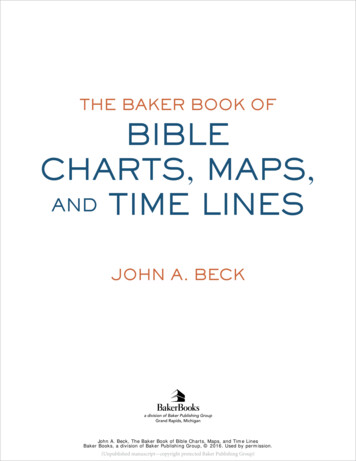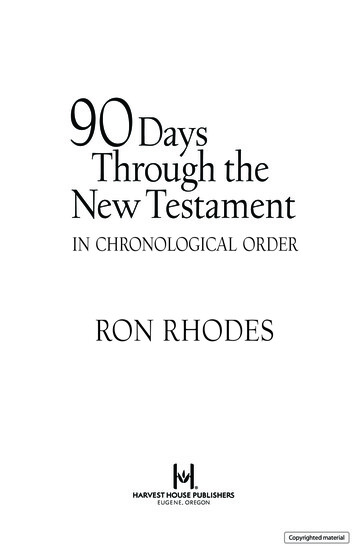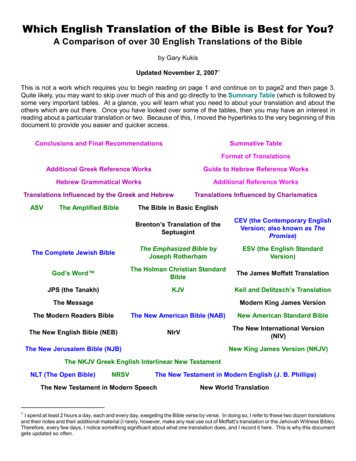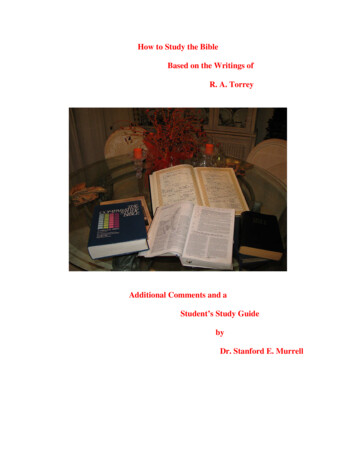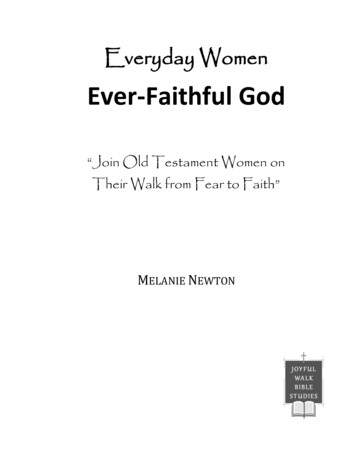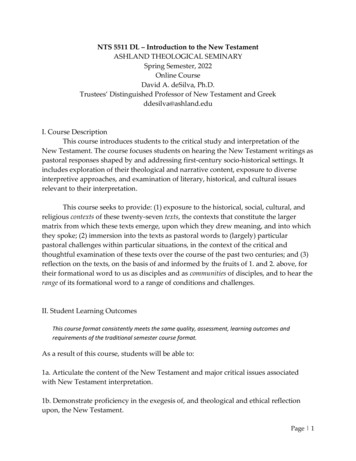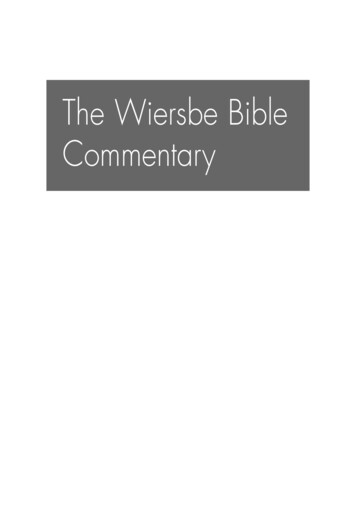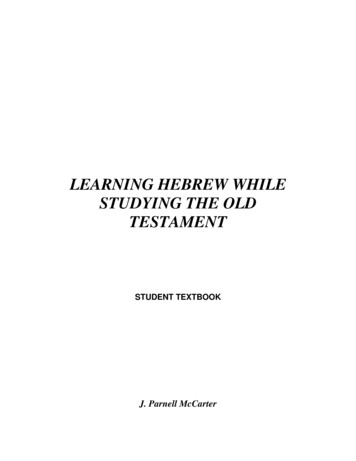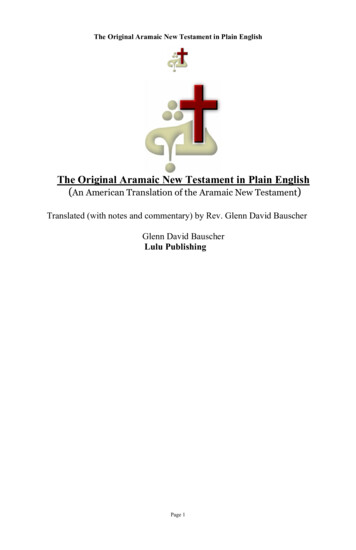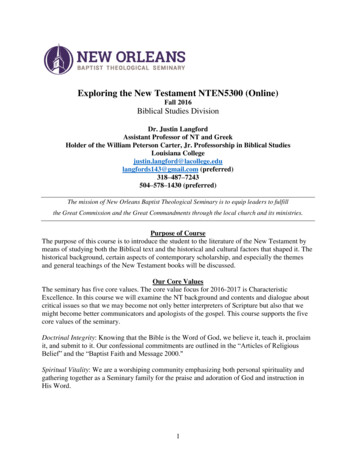
Transcription
Exploring the New Testament NTEN5300 (Online)Fall 2016Biblical Studies DivisionDr. Justin LangfordAssistant Professor of NT and GreekHolder of the William Peterson Carter, Jr. Professorship in Biblical StudiesLouisiana mail.com (preferred)318–487–7243504–578–1430 (preferred)The mission of New Orleans Baptist Theological Seminary is to equip leaders to fulfillthe Great Commission and the Great Commandments through the local church and its ministries.Purpose of CourseThe purpose of this course is to introduce the student to the literature of the New Testament bymeans of studying both the Biblical text and the historical and cultural factors that shaped it. Thehistorical background, certain aspects of contemporary scholarship, and especially the themesand general teachings of the New Testament books will be discussed.Our Core ValuesThe seminary has five core values. The core value focus for 2016-2017 is CharacteristicExcellence. In this course we will examine the NT background and contents and dialogue aboutcritical issues so that we may become not only better interpreters of Scripture but also that wemight become better communicators and apologists of the gospel. This course supports the fivecore values of the seminary.Doctrinal Integrity: Knowing that the Bible is the Word of God, we believe it, teach it, proclaimit, and submit to it. Our confessional commitments are outlined in the “Articles of ReligiousBelief” and the “Baptist Faith and Message 2000."Spiritual Vitality: We are a worshiping community emphasizing both personal spirituality andgathering together as a Seminary family for the praise and adoration of God and instruction inHis Word.1
Mission Focus: We are not here merely to get an education or to give one. We are here to changethe world by fulfilling the Great Commission and the Great Commandments through the localchurch and its ministries.Characteristic Excellence: What we do, we do to the utmost of our abilities and resources as atestimony to the glory of our Lord and Savior Jesus Christ.Servant Leadership: We follow the model of Jesus and exert leadership and influence throughthe nurture and encouragement of those around us.Curriculum Competencies AddressedNOBTS faculty members realize that all ministers need to develop specific competencies if theyare going to have an effective ministry. To increase the likelihood of NOBTS graduates havingan effective ministry, the faculty developed a competency-based curriculum after identifyingseven essential competencies necessary for effective ministry. All graduates are expected to haveat least a minimum level of competency in all of the following seven areas:Biblical Exposition: To interpret and communicate the Bible accurately.Christian Theological Heritage: To understand and interpret Christian theological heritage andBaptist polity for the church.Disciple Making: To stimulate church health through mobilizing the church for missions,evangelism, discipleship, and church growth.Interpersonal Skills: To perform pastoral care effectively, with skills in communication andconflict management.Servant Leadership: To serve churches effectively through team ministry.Spiritual and Character Formation: To provide moral leadership by modeling and mentoringChristian character and devotion.Worship Leadership: To facilitate worship effectively.The primary curriculum competency addressed in this course is Biblical Exposition.Student Learning OutcomesStudent Learning Outcomes Statement: The following student learning outcomes are employedto demonstrate the student’s proficiency in each of these areas. The student must demonstrateaccomplishment of each of the items described under the assessment area in order to pass thiscourse. Assessments will be conducted at the end of this course.1. The student will be able to understand thoroughly New Testament history, background, andcanon, and selected New Testament themes.2
2. The student will be able to apply adequately New Testament history, background, andcanon, and selected New Testament themes to contemporary church needs.3. The student will be able to communicate clearly New Testament history, background, andcanon, and selected New Testament themes to a contemporary audience.The Embedded Assignment1. A summative question will be answered thoroughly by the students as a take-homeportion of the final exam. The question (or research problem) will require research of thehistorical context, genre, theology, and/or interpretive concerns of a selected period,event, or passage. Answers should be well-developed and provide thoroughdocumentation and appropriate use of tools and resources. Students should use Times 12pt. font, 1-inch margins, single-spaced, approximately two pages in length.2. The student should show adequate application of the research to a selected need of theChristian community.3. The student should communicate clearly how the answer of the research question mightimpact the faith and life of Christian believers with focus on the contemporary audience.Embedded Assignment (0 Inadequate, 1 Basic, 2 Competent, 3 Good, 4 Excellent)DOMAINLEVELUNDERSTANDINGThe Student:Understood thoroughly New Testament history, background, andcanon, and selected themes of the New TestamentAPPLICATIONThe Student:Applied adequately New Testament history, background, and canon,and selected New Testament themes to contemporary church needsCOMMUNICATIONThe Student:Communicated clearly New Testament history, background, andcanon, and selected New Testament themes to a contemporary aud.EVALUATION0 1 2 3 4Required TextbooksThe Bible(any major translation or the Greek NT for NT portions, but we highly recommend thenewly released (2015) NIV Study Bible edited by our textbook authors D. A. Carson &Doug Moo)D. A. Carson and Douglas Moo, An Introduction to the New Testament. 2nd ed. Zondervan, 2005.Everett Ferguson, Backgrounds of Early Christianity, 3rd ed. Eerdman, 2003.Bruce Longenecker, The Lost Letters of Pergamum: A Story from the New Testament World.Baker Academic, 2003.3
Course Requirements1. Weekly QuizIn each Unit, there is a quiz based upon the textbook readings for that given week. These quizzesare based upon the readings and power points from the Unit materials for the given week. Theyare to be completed each week by Saturday night. 20% of total grade.2. Textbook and Bible Reading Reports:Each week the student will report on the percentage of the reading he/she completed. This is thehonor system reporting and will be calculated by 100%, 90%, 80%, etc. by the student andrecorded in the weekly Unit. Due weekly by Saturday night of each week. 10% of total grade.3. Book Critique:A two page, single-spaced critique of the book The Lost Letters of Pergamum will be submitted.By submitting a critique, the student is affirming that he or she has read the entire book. See thesyllabus for the due date. 10% of total grade.4. Two Major ExamsTwo major exams will be given as indicated in the class schedule. Anyone taking the test afterthe last day listed on the syllabus may incur a late penalty of 5% per day late. 50% of total grade.5. Embedded AssignmentAn embedded assignment is now required for all core courses. This assignment will be submittedby the student before the course closes. Here are the parameters of the question:Write a two-page essay (single spaced), 12-point font with 1-inch margins on the followingquestion. Upload your answer into the Upload Assignment area in Blackboard before thetermination of the semester (see catalog for semester closing dates). This question is an openbook, take-home project and is worth 10% of your final grade for this course.The Question:Select from a NT genre of your choice (Gospels, Letters, Acts, or Revelation) one book. Usingyour textbooks and any other sources of your choosing, write an essay answering each of thefollowing questions. Do not plagiarize and document your sources in Turabian format.1. What is the background for this book: authorship issues, date issues, where written,written to whom, and include how and when this book was entered into the Canon of theNT and other critical issues discussed by the authors of our textbooks.2. State major themes and/or contributions of this book and these relate to contemporarychurch needs.3. State briefly how you intend to apply this knowledge in your ministry context.COURSE EVALUATIONWeekly Reading and Power Point Quizzes:Reading Reports for Each Unit:Book Review:20%10%10%4
Mid-term and Final Exams: (25% per exam)50%Embedded Assignment: Is a take home assignment and will be uploaded by the student. 10%Quizzes and major examinations are timed, open book/notes and are taken online through theBlackboard course shell. Should you encounter an internet interruption or other technologicaldifficulty, don’t panic. Contact your Instructor and (s)he will assist you. We will work with youand re-set the exam or quiz.We recommend that you keep up with all your work throughout each week in the semester. Awise strategy for test taking is to use the review study guides and prepare the questions ahead oftime. A good recommendation would be to start no later than a week to prepare the studyquestions. Wise students will begin ten days to two weeks in advance.Part of ministry preparation is learning how to prepare for deadlines. There is a TimeManagement Strategy below in this syllabus. Consider this or some similar strategy formanaging your valuable time this semester. You will be working with deadlines for all of yourministerial career. Meeting your deadlines is a huge part of your professional and ministerialpreparedness. Take your deadlines seriously and you will be more highly respected in yourplaces of service.Course PoliciesReading AssignmentsStudents are responsible for completing all reading assignments.Professor’s Policy on Late AssignmentsAll work is due on the assigned date in the syllabus. The grade for late assignments willautomatically be reduced by 5% per day late.Professor’s Availability and Assignment FeedbackThe student may contact the professor at any time using the email address provided in thecourse syllabus. The professor will make every effort to return answers to emailedquestions within a 24-hour period of time. Assignments requiring grading will bereturned to the student within a reasonable period of time. Student feedback on gradedassignments will be provided through the grading rubric located in the student’sBlackboard Grade Book. The student will find comments in the grading rubric, as well ason graded paper assignments. The student may also email the course grader withquestions regarding grading.Help for Writing Papers at “The Write Stuff”This is the official NOBTS Writing Center online help site for writing academic papersand essays. http://www.nobts.edu/writing/default.html You will discover writing guides,tips, and valuable information to help you become a better writer. Go here for Turabianand APA style helps and guidelines. You will also find language fonts for Greek andHebrew.5
Academic Honesty PolicyAll graduate and undergraduate NOBTS students, whether on-campus, internet, orextension center students, are expected to adhere to the highest Christian standard ofhonesty and integrity when completing academic assignments for all courses in everydelivery system format. The Bible provides our standard for academic integrity andhonesty. This standard applies whether a student is taking tests, quizzes, exams, writingpapers, completing Discussion Boards, or any other course requirement.Plagiarism on Written AssignmentsNOBTS has a no tolerance policy for plagiarism. Please be aware that plagiarism incertain cases may result in expulsion from the seminary. Refer to the NOBTS StudentHandbook http://www.nobts.edu/ re the definition, penalties and policies associated with plagiarism are clearly defined.Classroom ParametersPlease arrive on time.Turn off cell phones. Utilize laptops and other technology for class purposes only.Respect the professor and other members of the class.Maintain confidentiality when someone shares personal information.Participate in class and group discussions.Blackboard and ITC Technical SupportBlackboard is the instructional platform used in this class. Please make sure that yourcontact information is accurate and up-to-date. If you need assistance accessingBlackboard, Selfserve, or other technical support, please contact the InformationTechnology Center (Hardin Student Center 290 or call 504.816.8180). Here are otherhelpful links to ITC assistance. Selfserve@nobts.edu - Email for technical questions/support requests with theSelfserve.nobts.edu site (Access to online registration, financial account, onlinetranscript, etc.)BlackboardHelpDesk@nobts.edu - Email for technical questions/support requests withthe NOBTS Blackboard Learning Management System NOBTS.Blackboard.com.ITCSupport@nobts.edu - Email for general technical questions/support requests.www.NOBTS.edu/itc/ - General NOBTS technical help information is provided on thiswebsite.For Student Assistance in using Blackboard, visit: Student Bb HelpNetiquetteNetiquette refers to appropriate online behavior in Blackboard or other onlinediscussions. Each student is expected to demonstrate appropriate Christian behaviorwhen working online on Discussion Boards or whenever interaction occurs through web,digital, or other electronic medium. The student is expected to interact with otherstudents in a fashion that will promote learning and respect for the opinions of others inthe course. A spirit of Christian charity is expected at all times in the onlineenvironment.6
Academic Catalog & PoliciesAcademic policies related to absences, grading scale, final examination schedules, andother topics can be found in the current online catalog: New Orleans Baptist TheologicalSeminary Academic Catalog.Web-based Course Reminder/WarningWeb-based courses are, by nature, a different kind of learning experience than coursestaught in the traditional classroom. Because of this structure, this web-based course ismore reading and writing intensive than traditional classroom courses. Rigorous study ofthe deep things of God can be a rewarding experience for anyone who participates in it,but it also calls for extra diligence and integrity in completing the work. This reality doesnot mean that a web-based course cannot be successful in equipping you, the student, foreffective, God-honoring ministry. It simply means utilizing a different strategy. Internetcourses allow room for independent learners to thrive—to work at a responsible pace, toengage in student-led discussions, and to take ownership of the learning of coursecontent. Note that your instructors are praying for your success.Policy for Graduating SeniorsGraduating Seniors are responsible for alerting the professor of your intention tograduate. All of your assignments must be completed by noon (12:00 PM) on theWednesday prior to commencement exercises.Course ScheduleEach Unit begins on a Sunday and ends on the Saturday of that given week (except for the firstand last weeks of the term). The due dates for assignments will be the Saturday night atmidnight for each scheduled Unit. For example, Unit 1 will begin on the opening day of thecourse as stated in the NOBTS Academic Catalog (see above under Academic Catalog Policies).Due dates will be Saturday night at midnight. Final exams are due by midnight on the dayinternet courses close, as listed in the Academic Catalog. The Information Technology Centerwill close all Blackboard shells at midnight Central Time on this date. Students will no longerhave access to the Bb shell after this time. Such dates will be listed in the NOBTS catalog. Hereare the calendar dates for the Blackboard course Units.Unit 1 8/22–8/27Unit 2 8/28–9/3Unit 3 9/4–9/10Unit 4 9/11–9/17Unit 5 9/18–9/24Unit 6 9/25–10/1Unit 7 10/2–10/8Unit 8 10/9–10/15Unit 9 10/23–10/29Unit 10 10/30–11/5Unit 11 11/6–11/12Unit 12 11/13–11/19Unit 13 11/27–12/3Units 14–15 12/4–12/10Unit 16 12/11–12/157
EACH UNIT REPRESENTS ONE WEEK’S WORK.OnlineBeginningTextbook Reading Reports & Bible Reading Report & Worksheetsand Study Dateare due at the end of the week they are assigned.UnitsUnit 1Week of:Unit 2Week of:Unit 3Week of:Unit 4Week of:Unit 5Week of:Unit 6Week of:Unit 7Week of:Unit 8Week of:Aug 22–27Aug 28–Sept 3Sept 4–10Sept 11–17Sept 18–24Sept 25–Oct 1Oct 2–8Oct 9–15 Chapters 1-2 Thinking About the NT & Intro to the SynopticGospels; Carson/Moo Ferguson Read pages 5-147 Chapters 3-4 Matthew and Mark -Carson/Moo Ferguson pages 300-316, 537-561 Read the Gospels of Matthew & Mark Chapters 5-6 Luke and John -Carson/Moo Read the Gospels of Luke & John Chapters 7 Acts Carson/Moo Bible Reading Reports Acts Chapter 8-9 Intro to NT Letters & Paul: Apostle & Theologian Carson/Moo Ferguson pages 562-582 Chapter 10 Romans -Carson/Moo Bible Reading Report on Romans Chapter 11 1-2 Corinthians -Carson/Moo Bible Reading 1-2 Corinthians Chapters 12, 13, 14 Galatians, Ephesians and Philippians Carson/Moo Bible Reading Galatians, Ephesians and Philippians Ferguson 592-620 Mid-Term Exam (will open this week)Fall BreakWeek of:Unit 9Week of:Oct 17–21Oct 23–29The Mid-Term will remain open this entire week, but you may take itanytime before. Chapters 15-16 Colossians and 1-2 Thessalonians -Carson/Moo Bible Reading Colossians and 1-2 Thessalonians8
Unit 10Unit 11Week of:Oct 30–Nov 5Week of:Nov 6–12 Chapters 17-18 Pastoral Epistles and Philemon –Carson/Moo Bible Reading 1-2 Timothy, Titus, Philemon Chapters 19-20 Hebrews and James - Carson/Moo Bible Reading Hebrews and JamesUnit 12Week of:Nov 13–19 Chapters 21-22 1-2 Peter - Carson/Moo Bible Reading 1-2 PeterThanksgivingBreakWeek of:Unit 13Week of:Nov 21–25Nov 27–Dec 3Enjoy the break! Chapters 23-24 1-3 John and Jude - Carson/Moo Bible Reading 1-3 John and JudeBook Review on the Lost Letters of Pergamum: Due by midnight ofSaturday this weekUnits 14–15Week of:Dec 4–10 Chapter 25 Revelation -Carson and Moo Chapter 26 Canon –Carson/Moo Ferguson pages 182-212 Bible Reading RevelationUnit 16Week of:Dec 11–15Course closeson: Dec 15thFINAL EXAM: The Exam will be open all of Finals WeekThe final sectional exam will open in Blackboard and mustbe taken by the closing date indicated in the SeminaryAcademic Catalog. Our Blackboard shell will close at 11:59PM Central Time of that day.Recommended Computer SoftwareThe student is strongly encouraged to purchase Bible software for his/her use in biblicalexegesis. At this level of study, a software program capable of producing the text, performingsophisticated morphological searches, with available lexicons, commentaries, and other helpfulsupplemental works is an absolute necessity. The software packages listed below are capable ofintense, complex searches required for biblical studies research purposes and/or sermonpreparation. The purchase of this kind of software is indispensable at this level of languagestudy. The major software packages all run on either PC or Mac platforms.9
Accordance:The Original Languages Package is around 300 with many other add-on texts available and theyoffer student discounts. Accordance has a PC emulator as well. Responses have been varied onthis emulator. Call their customer service for questions and student ks (bibleworks.com) provides discounts for our students when purchased in bulk orders(see your professor for more information). BibleWorks costs about 350 for their basic softwareprogram which includes many supplemental works. Ordered in bundles of 10 or more, the priceis reduced to 250 for NOBTS seminary students. Bulk orders are placed through the localNOBTS LifeWay Store. Call their customer service for questions and student discounts.(bibleworks.com)Logos 6:Logos 6.0 is offered at varied package prices, but we recommend that you consider a minimumof the Bronze Level package that has the Greek and Hebrew texts for NOBTS language courses.NOBTS offers a training course called PREA6230/6330 Technological Applications for BibleStudy and Preaching. Students who take this course may purchase the software at a 50%discount. Students who purchase the software directly from Logos receive a 30% discount. Calltheir customer service for questions and student discounts. (logos.com)How Can I Learn Time Management?1. Use a personal calendarAs simple as this may sound, many ministers have not mastered the use of their calendar. Use apaper calendar or electronic calendar of your choice on your phone or computer--but use it! Hereis one method for learning how to use your calendar:a. Mark your Project Due Date:Take your syllabus, right now, and mark EVERY assignment due date.Simply transfer this step to your professional project due dates as well. Dothis immediately when you receive a due date of any kind.b. Calculate your Project Start Date:Give consideration to how long you think the assignment/project willrealistically take to complete and ‘back up’ on your calendar that amountof time.c. Add about 10-15% more time to allow for foreseen events that always come up:In ministry, unforeseen events always occur. Learn to build in a timecushion that will absorb these events and keep your project on track.d. Mark the adjusted, calculation for the Project Start Date on your calendar.e. Discipline yourself to start the project on your calculated date.This is the most critical and difficult part of time management. Disciplineyourself to start on the timetable you set for yourself.f. Adjust as needed10
2. Use a “To Do List”This is crucial for time management. Once you have your Project Start Dates on the calendar,your To Do List helps you visualize what you need to accomplish this particular day during yourbusy schedule. This is3. Look at your calendar first thing as you start your day.No exceptions! You MUST learn to view your calendar daily. You may miss deadlines andresponsibilities if you fail simply to look at your calendar.4. Prioritize your “To Do List”Ask God during your morning prayers to help you prioritize and accomplish your tasks to Hisglory!5. Work down your prioritized listAfter step 4, discipline yourself to do each item! Check them off as a small reward foraccomplishing each task.6. Carry over unfinished items to the next day’s “To Do List”Some days you just cannot get it all done and sometimes God rearranges your day. Be realisticand move unfinished items to the next day.Mastering calendar use is primarily a self-discipline issue. Once you learn to mark yourdeadlines and follow your calendar, you will feel a wonderful sense of freedom. You will notmiss any deadline in your life. All of your responsibilities will be right in your calendar and allyou have to do is follow it. You will also have confidence to know that you will meet all of thesedeadlines in a professional manner. Much success in your ministry hinges upon threeimperatives: “Show up!” “Show up on time!” “Show up prepared!”Bibliography Sourceswww.Denverseminary.edu has an annually updated bibliography for both OT and NT located intheir Library section of their website.www.bestcommentaries.com is another great website for finding commentaries.NEW TESTAMENT BIBLIOGRAPHYThis bibliography is somewhat comprehensive, but is presented for benefit of the student whodesires to go further into New Testament studies and, possibly, doctoral work.New Testament IntroductionsAchtemeier, Paul J., J. B. Green, and M. M. Thompson. Introducing the New Testament: ItsLiterature and Theology. Grand Rapids: Eerdmans, 2001.Barr, D. L. New Testament Story: An Introduction. 2nd ed. Belmont, CA: Wadsworth, 1995.11
Brown, Raymond E. An Introduction to the New Testament. New York: Doubleday, 1997Carson, D. A., Douglas J. Moo, Leon Morris. An Introduction to the New Testament. 2nd ed.Grand Rapids: Zondervan, 2005.Drane, John. Introducing the New Testament. San Francisco: Harper & Row, 1986.Ehrman, Bart. The New Testament: A Historical Introduction to the Early Christian Writings.2nd ed. New York: Oxford University Press, 2000.Feine, Paul, J. Behm, and W. G. Kummel. Introduction to the New Testament. Nashville:Abingdon Press, 1965.Gundry, Robert H. A Survey of the New Testament. 3d. ed. Grand Rapids: Zondervan, 1994.Guthrie, Donald. New Testament Introduction. 3d rev. ed. Downer’s Grove: InterVarsity, 1970.Johnson, Luke Timothy. The Writings of the New Testament: An Interpretation. Philadelphia:Fortress Press, 1986.Koester, Helmut. Introduction to the New Testament. Vol. 1: History, Culture, and Religion ofthe Hellenistic Age. 2d. ed. Berlin: Walter de Gruyter, 1995.Kümmel, Werner Georg. Introduction to the New Testament. Trans. Howard Clark Kee (basedon the 17th German edition). Nashville: Abingdon, 1975.Metzger, Bruce M. The New Testament: Its Background, Growth, and Content. Nashville:Abingdon Press, 1965.New Testament BackgroundsPrimary SourcesBarrett, C. K., ed. The New Testament Background: Selected Documents. Rev. ed. SanFrancisco: Harper & Row, 1995.Bruce, F. F. New Testament History. New York: Doubleday, 1970.Carcopino, Jerome. Daily Life in Ancient Rome. New York: Yale University, 1968. (Rec.)Charles, R. H., trans. The Apocrypha and Pseudepigrapha of the Old Testament in English,Volume 2: Pseudepigrapha. London: Epworth, 1913.Charlesworth, James H., ed. The Old Testament Pseudepigrapha, Volume 2: ApocalypticLiterature & Testaments. Garden City, New York: Doubleday, 1983.Danby, Herbert, trans. The Mishnah. Oxford: Oxford University Press, 1933.12
DeSilva, David A. Introducing the Apocrypha: Message, Context, and Significance. GrandRapids: Baker, 2002.Evans, Craig A. Noncanonical Writings and New Testament Interpretation. Hendrickson, 1992.Ferguson, Everett. Backgrounds of Early Christianity. 3d ed. Grand Rapids: William B.Eerdmans Publishing Co., 2003.Goodenough, Erwin R. An Introduction to Philo Judaeus. Oxford: Basil Blackwell, 1962.Grant, Frederick C. Roman Hellenism and the New Testament. New York: Scribner, 1962.Helyer, Larry. Exploring Jewish Literature of the Second Temple Period. Downer’s Grove, Ill.:Intervarsity, 2002.Hennecke, Edgar, and Wilhelm Schneemelcher, eds. The New Testament Apocrypha. Englishtrans. ed. by R. McL. Wilson. Philadelphia: Westminster Press, 1963.House, H. Wayne. Chronological and Background Charts of the New Testament. Grand Rapids:Zondervan, 1981.Jeremias, Joachim. Jerusalem in the Time of Jesus: An Investigation into Economic and SocialConditions During the New Testament Period. Philadelphia: Fortress Press, 1969.Johnson, Luke T. The Writings of the New Testament: An Interpretation. Philadelphia: FortressPress, 1986.Josephus, Flavius. Jewish Antiquities. Trans. H. St. J. Thackeray. Cambridge, Mass.: HarvardUniversity Press, 1995-1998. The Jewish War. Trans. H. St. John Thackeray. Cambridge, Mass.: HarvardUniversity Press, 1997.Kee, Howard Clark. The New Testament In Context: Sources and Documents. Englewood Cliffs,New Jersey: Prentice-Hall, Inc., 1984.Lea, Thomas D. The New Testament: Its Background and Message. Nashville: Broadman &Holman, 1996.Lightfoot, J. B. and J. R. Harmer, eds. and trans. The Apostolic Fathers: Greek Texts and EnglishTranslations of Their Writings. 2d ed. Ed. and rev. by Michael W. Holmes. GrandRapids: Baker Book House, 1999.Logan, Alistair and A. J. M. Wedderburn, eds. The New Testament and Gnosis. London: T. & T.Clark, 2004.13
Lohse, Eduard. The New Testament Environment. Trans. by John E. Steely. Nashville: AbingdonPress, 1987.Malina, Bruce J. The New Testament World: Insights From Cultural Anthropology. Louisville:John Knox Press, 1981.Mason, Steven M. Josephus and the New Testament. Hendrickson, 2003.McRay, John. Archeology and the New Testament. Grand Rapids: Baker Book House, 1991.Millard, Alan. Reading and Writing in the Time of Jesus. Sheffield: Sheffield Academic Press,2000.Neusner, Jacob. Mishnah: A New Translation. New Haven: Yale University, 1988.Reicke, Bo. The New Testament Era: The World of the Bible From 500 B.C. to A.D. 100. Trans.by David Green. London: Adam & Charles Black, 1969.Robinson, James A., ed. The Nag Hammadi Library in English. 3d. ed. San Francisco: Harper,1990.Sanders, E. P. Judaism: Practice and Belief, 63 BCE - 66 CE. Trinity, 1992.Schneemelcher, Wilhelm, Editor. R. M. Wilson, Translator. New Testament Apocrypha:Gospels and Related Writings. Vol. 1. Revised Ed. John Knox Press, 1991.Schneemelcher, Wilhelm, Editor. R. M. Wilson, Translator. New Testament Apocrypha:Writings Relating to the Apostles, Apocalypses, and Related Subjects. Vol. 2. RevisedEd. John Knox Press, 1992 (or most recent ed.).Sherwin-White, A. N. Roman Society and Roman Law in the New Testament. Oxford: ClarendonPress, 1963.Suetonius. The Twelve Caesars. Trans. by Michael Grant, Penguin Classics, Viking Press, 1991.Vermes, Geza. trans. The Dead Sea Scrolls in English. 5th ed. Baltimore: Penguin Books, 1998.Whiston, William. trans. Josephus: Complete Works. Grand Rapids: Kregel, 1974.Witherington, Ben. New Testament History. Grand Rapids: Baker, 2001.Wright, N. T. The New Testament and the People of God. Vol. 1 of Christian Origins and theQuestion of God. Philadelphia: Fortress Press, 1992.14
Secondary SourcesAchtemeier, Harper’s Bible DictionaryBeitzel, The Moody Atlas of Bible LandsBlaiklock and Harrison, The New International Dictionary of Biblical ArcheologyBromily, International Standard Bible EncyclopediaButler, Holman Bible DictionaryCharlesworth, Jesus Within JudaismEvans, C. E., and Stanley E. Porter, eds. Dictionary of New Testament Background. DownersGrove: InterVarsity, 2000.Freedman, Anchor Bible DictionaryKenyon, Frederic. The Bible and Archaeology. 1940.Russell, Between the TestamentsT
2. The student will be able to apply adequately New Testament history, background, and canon, and selected New Testament themes to contemporary church needs. 3. The student will be able to communicate clearly New Testament history, background, and canon, and selected New Testament them
